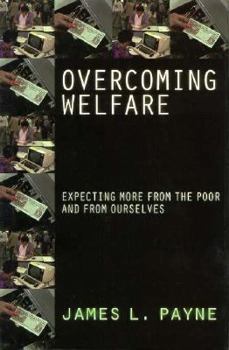Overcoming Welfare: Expecting More from the Poor--And from Ourselves
A fundamental goal of today's welfare reform is to practice "expectant giving" to demand constructive steps from the needy in exchange for assistance. This idea is not new. Since the nineteenth... This description may be from another edition of this product.
Format:Hardcover
Language:English
ISBN:046506924X
ISBN13:9780465069248
Release Date:May 1998
Publisher:Basic Books
Length:288 Pages
Weight:1.20 lbs.
Dimensions:1.1" x 6.4" x 9.6"
Customer Reviews
4 ratings
An Excellent Analysis of Social Welfare Policy
Published by Thriftbooks.com User , 23 years ago
As an attorney who has done pro bono and charity work to help poor people, but who also has prosecuted welfare fraud and food stamp fraud cases, and as an attorney (and future trustee) for a very large charitable foundation that seeks to help the poor, I found James L. Payne's, "Overcoming Welfare," an excellent look at the sorry reality of entitlement programs, which are based predominantly on what Payne calls "sympathetic giving." Payne does a reasonably thorough job, using a very accessible writing style, not only in explaining why sympathetic giving programs fail and are destined to fail (human nature and the "aggravation principle," plus inherent problems with bureaucracy), but in advocating a better alternative -- expectant giving. I have seen both types of giving at work, and I am convinced that expectant giving, although not perfect (no poverty program is), is far and away superior to sympathetic giving. This book is an excellent introduction to the field. I wish everyone in the poverty relief field would read it.
from a Private Charitable Foundation perspective
Published by Thriftbooks.com User , 23 years ago
As an attorney, I have done some pro bono work in the past and have also helped out in soup kitchens and Salvation Army food vans. I work for a private charitable foundation the mission of which is to help the poor; someday, I will be one of the trustees making grant decisions. I have attended poverty-related seminars at the annual Council on Foundations meeting; the single point of view represented there is that of a need for ever-increasing entitlement benefits. Thus, policy issues relating to poverty are of major practical concern to me. For this reason, James L. Payne's book was a breath of fresh air. For a variety of reasons, I think that Payne hits the nail right on the head in his analysis of the reasons for the failure of poverty programs that practice what he calls "sympathetic giving." Although some receipients find their way out of poverty, it is despite these programs, not because of them. Sympathetic giving provides extremely perverse incentives (the "aggravation principle") not to work one's way out of poverty. It is basic human nature at work. Our government has wasted trillions of dollars on misguided anti-poverty policies. The bureaucratic structure of government programs helps to guarantee the poor result, especially with something-for-nothing give-aways. The fraud is substantial. I've seen it at work for 20 years; oh, the true stories I could relate! I was sincerely touched by Payne's telling of the success stories that resulted from what he calls "expectant giving." I now am convinced that expectant giving is the better way to help people in need. The challenge is to bring to an end all government poverty programs (whether rapidly or gradually), and to leave it to private charity to deal with the poverty problem. No doubt, there always will be poor people, but expectant giving, properly carried out, will be more effective in result than sympathetic giving programs. I am so impressed with Payne's book that I want to purchase many copies of it and give them to friends and acquaintances in the poverty field, in the hope that we can begin to think and act differently in our approach to poor people, so that we can truly help, rather than hinder, their lives in the long run. I would really like to speak to Mr. Payne about how to make this happen.
The benefits of personal responsibility
Published by Thriftbooks.com User , 23 years ago
Mr. Payne confronts liberal ideology head-on in this thoughtful study of governmental excesses and lack of accountability. The welfare system is shown as clearly a beast of epic proportion, with the prospect of true reform daunting at best. Mr. Payne excels at presenting the potentially onerous subject matter in a very readable form. The history, examples, and proposed solutions make for a very enlightening read. I thoroughly enjoyed this book!
A thoughtful, concise, compelling read.
Published by Thriftbooks.com User , 26 years ago
In reviewing this particular book, it's hard to figure where to begin, the book is so well-written and informative. If the subject interests you, this book is the one you want to read and keep on a shelf for future reference. Payne's writing style is seductive, and never bores. His insight into where societies usually go wrong is the best I have ever seen. But more importantly, this book is not just a criticism of welfare spending; it is a thoughtful, concise and compelling explanation of what needs to be done to save the system and help those who need our assistance most. I cannot recommend it enough, except to say, it's books such as this which make book buying so worthwhile. Thank you, Mr. Payne for your insight, and for taking the time to do it right.





